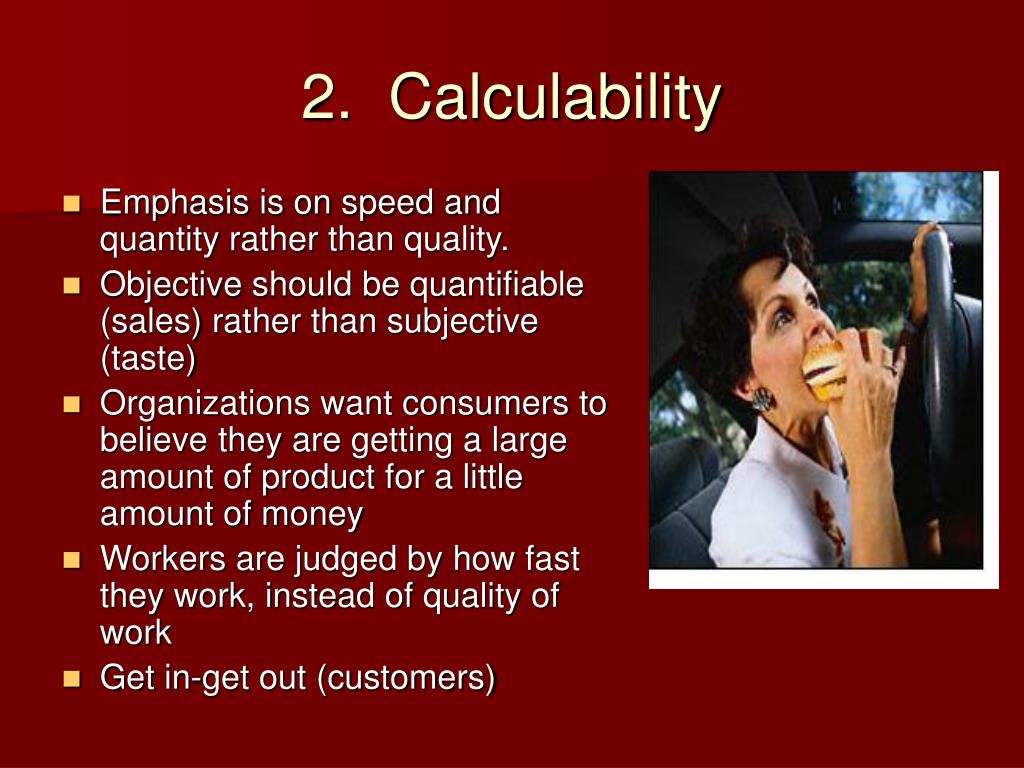Imagine a world where every aspect of your life is measured, timed, and optimized. Where the pursuit of efficiency dictates your interactions, your choices, and even your emotions. This isn’t a dystopian novel; it’s a reality we increasingly encounter in our modern world, a phenomenon sociologist George Ritzer termed “Mcdonaldization.” At its core, Mcdonaldization describes the spread of fast-food restaurant principles – efficiency, calculability, predictability, and control – to other spheres of life. Amongst these principles, calculability plays a pivotal role, shaping how we perceive and experience our world.

Image: www.slideserve.com
Calculability, simply put, is the relentless pursuit of quantifiable metrics. It’s the obsession with measuring, counting, and comparing, where success is defined by efficiency and output. While this principle initially appears as an instrument for progress, it has far-reaching implications for our society, impacting everything from the food we eat to the way we think. This article delves into the intricacies of Mcdonaldization and particularly explores how calculability shapes our reality, ultimately examining its potential benefits and detrimental consequences.
Understanding the “Mcdonaldization” Phenomenon
Mcdonaldization, coined by George Ritzer in his seminal work “The McDonaldization of Society,” refers to the process by which principles of fast-food restaurants, like McDonald’s, are applied to various aspects of modern life. These principles, known as the “Four Dimensions of Mcdonaldization,” include:
- Efficiency: Focuses on minimizing time and effort, finding the most streamlined method to achieve a goal. Think of the assembly line approach in fast-food restaurants or the optimizing algorithms on our smartphones.
- Calculability: Emphasizes quantifiable metrics, emphasizing speed and output over quality or experience. This is evident in the “value meals” and “supersize” options in fast food, or in the “likes” and “followers” metrics on social media platforms.
- Predictability: Aims for uniformity and standardization, ensuring a consistent experience across different locations or instances. This is seen in the standardized menus and recipes in fast food chains or the predictable routines followed in many workplaces.
- Control: Seeks to eliminate human error and unpredictability through automation and technology. This can be observed in the automated ordering systems in fast food restaurants or the standardized procedures in healthcare settings.
How Calculability Shapes Our World
Calculability, arguably the most pervasive of these principles, permeates various aspects of our lives:
- Education: Emphasis on standardized testing and measurable outcomes, often neglecting the development of critical thinking and creativity. This results in a focus on “teaching to the test,” reducing the nuanced process of learning to a quantifiable output.
- Healthcare: The rise of managed care systems and the increasing focus on cost-effectiveness create pressure on healthcare professionals to prioritize efficiency over individualized patient care. This leads to short consultations, restricted access to specialists, and the potential for overlooking crucial aspects of a patient’s well-being.
- Work: From the use of time-tracking software to performance reviews based on quantifiable goals, work increasingly operates under the influence of calculability. This often leads to a culture of constant measurement and pressure to meet targets, potentially neglecting the overall well-being and satisfaction of employees.
- Leisure: This is also influenced by calculability. The popularity of “bucket list” travel, gamified experiences, and the pursuit of “likes” on social media platforms underscores the urge to quantify and measure even leisure activities, obscuring the intrinsic value of enjoyment.
The Consequences of Calculability
While the pursuit of efficiency and calculability might initially seem appealing, its spread has unintended consequences:
- Dehumanization: By focusing solely on quantifiable metrics, we risk neglecting the human element in various aspects of life. This can lead to a sense of alienation, as individuals are reduced to mere data points in a system.
- Diminished Quality: The drive for efficiency and predictability can lead to a decline in quality, as corners are cut and attention to detail is sacrificed. This is seen in mass-produced goods, standardized services, and even in the declining quality of food in fast-food restaurants.
- Loss of Creativity: The constant pressure to quantify and measure can stifle creativity and innovation, as individuals become focused solely on achieving predetermined goals. This can restrict exploration and exploration of alternative solutions, leading to a stagnant and uninspired environment.
- Increasing Inequality: The focus on efficiency and calculability often benefits the more privileged, while marginalizing those who do not fit neatly into a quantifiable framework. This can exacerbate social inequalities, as certain groups lack access to resources and opportunities deemed “efficient” or “measurable.”

Image: www.woudhuysen.com
Mcdonaldization Calculability
Finding a Balance: Moving Beyond the Efficiency Trap
While Mcdonaldization and the principle of calculability have their benefits, it’s vital to acknowledge their potential downsides and strive for a balanced approach. We need to be mindful of the human cost of efficiency and resist the urge to measure everything.
To address this, a shift in mindset is crucial. We can:
- Prioritize Quality over Quantity: Strive for excellence in our work, our relationships, and our lives, even if it means taking time and effort.
- Embrace Intuition and Creativity: Encourage exploration, experimentation, and out-of-the-box thinking, allowing room for serendipity and unforeseen outcomes.
- Foster Empathy and Connection: Focus on building genuine relationships and understanding rather than simply meeting standardized requirements.
- Support Sustainable Practices: Move beyond the pursuit of immediate profits and short-term gains, considering the long-term impact of our actions.
Mcdonaldization and the principle of calculability are powerful forces shaping our world. By acknowledging their influence, understanding their implications, and promoting a more nuanced and balanced approach, we can prevent the dehumanizing and detrimental consequences of this pervasive phenomenon.






